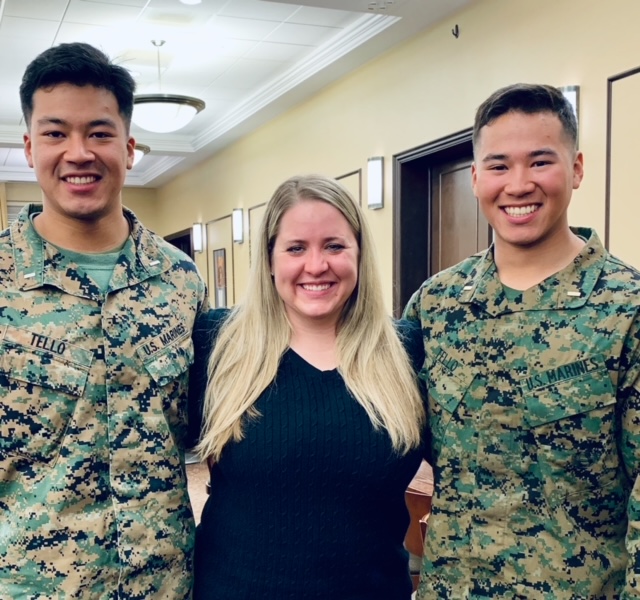
Meet Stephanie Symons, a 2008 Department of Athletic Training graduate who's working as an athletic trainer for the United States Marine Corps:
"I’m from South Jordan, Utah and went to Bingham High School. I started out at the U on a music scholarship, I was a percussion performance major in the Marching Band, Wind Ensemble and Utah Philharmonia. But I knew I wanted a regular paying job—my mom was a nurse, and my dad was a part time coach at my high school. I wanted to be involved in athletics and sports, and health and exercise science interested me. Athletic training seemed like a perfect fit."

What did you plan to do when you graduated?
"I thought I’d end up working in athletics. I was a student athletic trainer with the Utah football team. I had a great time but man, there were some long days. We’d get done with our classes and go to the football practice center, get the water and taping set up, hand out water during practice, post-practice treatments and then clean up and prep for the next day. Then I’d go home and study and do it all again. But game days were so much fun and I still keep in touch with some of my fellow student trainers and athletes. I also played in the marching band for three years, so I went to every home football game while I was in school. Three years in the band and the rest as a student AT and as an EMT. I just loved being in that environment! It’s such a huge part of my college experience.
After I graduated, I went straight to grad school and worked as a graduate assistant at George Mason University. I was an athletic trainer for their school of dance working with modern dancers. I ended up working at a small DIII college after that for a couple of years, but I got so burnt out. That was my dream and my goal, and I still wanted to be an athletic trainer, but I didn’t want to do it at a university anymore."
How did you end up with the Marines?
"Honestly it was just a Google search. My grandma lived in Southern California, and I wanted to get a job close by. I found a position at Camp Pendleton and applied, then they asked how I felt about working in Virginia. I’ve been at Quantico ever since and I don’t want to do anything else. I’m at The Basic School where all new officers go for an additional six months of training before they go to their specialty school. We see about 2,500 students a year, mostly new second lieutenants but we take care of everyone. We run a sick call in the morning and watch them do their physical training and even go on the hikes with them. We’re busy but it's fun. The hours are great, with very few nights, weekends or holidays."
What’s your work like today?
"Marines are very gung-ho, motivated, fit, individuals, so we’re protecting them from themselves most of the time. We mostly see lower extremity injuries but yesterday I had a dislocated shoulder during some ground fighting. I’ve seen everything from a bloody nose to a femur fracture. At first it was a really intimidating environment, but being an athletic trainer, an ankle is an ankle. Working with company commanders was like working with a head coach again. It took me about six months to get comfortable with their lingo, tempo and understanding what their training consists of. I’ve been here nine years and still love it. It’s nice because if a student doesn’t come in for treatment, I let their chain of command know and they’re in the next day. The staff is very supportive of what we do, I feel like we are all on the same page."
How do you feel like the College of Health prepared you for your current career?
"I think the fact that I was able to work with football and have such a high volume of athletes at once was really helpful. Although it seemed overwhelming at the time! You learn a lot of good multitasking and how to triage different people. I was lucky to work at a big DI school and get experience in that environment, not only with football but with men’s and women's tennis too. I’ve noticed there’s a huge difference between athletic trainers who worked with football and college athletics versus those who worked in a clinic only. We understand that game day is game day, there’s a deadline you can’t change. This morning I had 22 people to see in three hours, and it was just like getting players ready for a football game. I think I have an advantage over my coworkers in that regard."
What advice would you give to a student wanting to pursue a similar career?
"Go for it! It’s huge to get some experience working in college sports, even high school sports. The Army is looking to hire over 100 athletic trainers, the Marines have over 60 and are looking to expand, so it’s really an up-and-coming field. Having that background in sports and being able to make quick decisions have helped me quite a bit. I didn’t have the exact requirements they wanted but I was willing and eager to learn and had some experience."
What does More Health, Less Medicine mean to you?
"Take care of yourself and try to be more preventive about things. A mentor of mine once said “people could solve a lot their physical problems if they’d go out and hike. Walking and carrying a little bit of weight is a fantastic exercise.” It doesn’t take a fancy gym membership to stay active and strive to do something every day."